How does Poland welcome Spring? Posted by Kasia on Mar 20, 2017 in Nature
In every culture, where the winter is long, dark and cold, people have made a great effort to ensure that spring arrives on time; they search for signs in nature to confirm that the long awaited spring is just around the corner. In Poland , one of these signs is the return of the storks from warm climates. These birds are a sign that nature is awakening to life after a long winter. Along with the arrival of the storks, people start to prepare for what is called “the drowning of Marzanna” (topienie Marzanny).
Marzanna is a straw figure representing death, winter, disease and, in general, all evil. The figure is braided from straw into the shape of a human, and dressed in a traditional local women’s clothing. Then Marzanna is set on fire and thrown into a river or pond. Meant to bring about the change of the seasons, from winter to spring, this custom was known all over Europe . Its roots undoubtedly date back to the ancient, pre-Christian sacrificial rites of pagans. As a pagan ritual, the Polish Poznań bishops’ Synod of 1420 attempted to condemn the drowning of Marzanna and fought to end this custom. The battle was clearly lost and till this day the drowning of Marzanna is part of Polish culture. Though the traditional elements of the ritual remain unchanged the participants differ from those of the medieval period. Since the 19 th century, topienie Marzanny is primarily a ritual game played by children and teenagers.
Celebrated on March 21 st, the first day of spring, it has taken on the form of a spring festival celebrated all over Poland primarily by school children. In the late 1970’s high school students started skipping school on that day. Though truancy was strictly forbidden, year after year on March 2 st, more and more high school students would roam the streets of big cities. Finally, this became a real problem for the Department of Education. In the late 1990’s, before the problem spun out of control, officials in the Department of Education gave up. They officially named the first day of spring Truant’s Day (Dzień Wagarowicza). There are no regular classes on March 21 st. Instead, special school activities are organized. Students wear masks, funny costumes, and generally take liberty to do what they want.
I found couple great poems about Marzanna and translated them for you:) Enjoy!
Marzanna, W. Chotomska
Ruszamy gromadą, wesołym pochodem
niesiemy marzannę, nad zieloną wodę.
We move as group, happy procession
We carry Marzanna, over green water.
Zgiń, przepadnij zimo i nie wracaj do nas.
Na przyjęcie wiosny otwórzmy ramiona.
Die, get lost and do not come back to us.
Let’s open our arms for spring.
Płyń sobie Marzanno szumiącym potokiem.
Na morze szerokie, na morze głębokie.
Swim Marzanna with the raging stream.
To the wide sea, to the deep sea.
A teraz, gdy zima poszła już daleko
Zatańcz z nami wiosno nad zieloną rzeką.
And now that winter has gone far
Dance with us spring over the green river.
“Pożegnanie zimy” E. Romaniec – Zawadzka
Ostatnie wzgórki śniegu
już znikają na łące.
Cała ziemia paruje,
i wyżej świeci słońce.
Last snow hills
Already disappearing in the meadow.
The whole earth evaporates,
And the sun shines brighter.
Bałwanek na podwórku
już się zamienia w wodę,
a wierzby wokół domu
puszczają pędy młode.
Snowman in the yard
It is already turning into water,
And willows around the house
They start blooming.
Lecz wiosna nie przychodzi
choć ciągle o niej śnimy,
bo boi się Marzanny
złej wróżki śnieżnej zimy.
But spring does not come
Although we still dream about her,
Because she is afraid of Marzanna
Bad fortune snow winter
Nie zakwitną pierwiosnki,
nie zazielenią się zboża,
dopóki zła Marzanna
nie odpłynie do morza.
No primrose will blossom,
Wheat will not get green,
Until evil Marzanna
Will not go to sea.
Niechaj wiosna przybywa,
a zima szybko znika.
Zrobimy dziś Marzannę
ze słomy i z patyka.
May the spring come,
And winter quickly disappears.
We will make Marzanna today
With straw and a stick.
Śpiewając pieśń o wiośnie,
spotkamy się nad rzeczką,
wrzucimy w nią Marzannę
niech płynie hen daleko.
Singing a song about a spring,
We will meet at the river,
We will put Marzanna in it
Let her flow far away.

Build vocabulary, practice pronunciation, and more with Transparent Language Online. Available anytime, anywhere, on any device.





